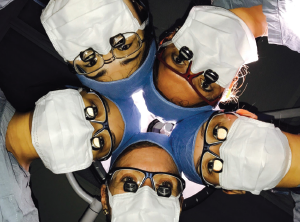
Women otolaryngologists at Henry Ford Hospital.
© Henry Ford Health System Otolaryngology Department
Although women now comprise almost half of all medical students in the United States and more women occupy leadership positions in academic medicine now than ever before in U.S. history, they still face challenges in the healthcare sector. Most notably, these include gender bias and sexual harassment (Acad Med. 2018;93:163–165.)
Explore This Issue
April 2018, August 2008As a medical student interviewing with a program chairman for an otolaryngology position, Inna Husain, MD, assistant professor and section head of laryngology in the department of Otorhinolaryngology and director of the Voice, Airway, and Swallowing Disorders Program at Rush University Medical Center in Chicago, had an experience that still bothers her today. “When reviewing a letter of recommendation, the chairman commented on how one of the male writers held me in such high regard,” Dr. Husain recalled. “He then jokingly asked what I had done to get such a raving review—did I have a relationship with the author?”
Dr. Husain was shocked at the implication. “I was taken aback by the question and wasn’t sure how to respond; I laughed nervously and smiled to make it seem like it wasn’t a big deal,” she said. “To do so much hard work and to have someone imply that my achievements might be due to something non-academic was very upsetting. It made me feel like I wasn’t worthy of the position. I don’t think something like this would have happened if I was a man.”
The #MeToo Movement
As more and more Hollywood actresses share their stories about sexual harassment and gender bias, women in other industries—including the medical field and even those as specialized as otolaryngology—are opening up about similar experiences. The scenarios run the gamut.
Sujana S. Chandrasekhar, MD, past president of American Academy of Otolaryngology-Head and Neck Surgery and director of New York Otology, recalled being asked by men interviewing her for residency positions if she was dating, engaged, or married. “It was really ridiculous, but of course I didn’t respond by saying that he wasn’t supposed to ask me such questions, because he was in a position of power,” she said. “I didn’t feel comfortable saying that.”
Dr. Chandrasekhar also believes that men view men and women with younger children differently. “A man with children is viewed as someone with solid character who will stick around for the long run, while a woman [with children] is viewed as someone on the ‘mommy track’ who will either stop working or reduce her hours to part-time,” she said. “I remember telling a chairman I was pregnant, and his response was, ‘You’re going to ruin another summer for me.’”
Experiencing Bias
Melissa A. Pynnonen, MD, MSc, medical director of West Ann Arbor Health Center at Parkland Plaza and professor of otolaryngology and director of Health Services Research at the University of Michigan in Ann Arbor, has experienced frustration as a result of gender bias, particularly with regard to the lack of opportunities women have in comparison with men. “I started noticing this after finishing my training,” she said. “As a faculty member, opportunities weren’t evenly dispersed. Most healthcare providers in the otolaryngology field are men, and they typically reach out to other men with opportunities, such as writing a book chapter.”